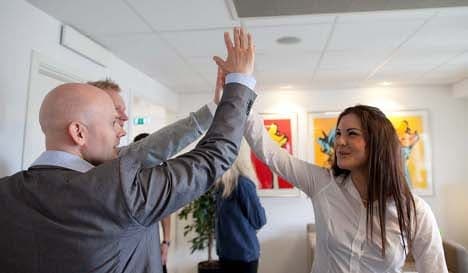Effective leadership: The art of getting decisions made in Sweden
The decision-making dilemma is no joke but something of a riddle for managers new to corporate culture in Sweden. The course Effective Leadership in Sweden gets straight to the point and assists managers in getting their team to do the same.

“How long do we have?” asks Nils Hallén when asked to clarify the dos and don’ts of leadership in the Swedish workplace.
Hallén has two days to explain, as course leader for the Efficient Leadership in Sweden course, run by Företagsuniversitetet on May 27-28th.
The course provides an essential introduction for managers from any industry.
“It’s primarily for non-Swedish leaders who are quite new to their position,” Hallén says. “They might either come from a Swedish organisation or an international company in Sweden.
Content also covers a broad foundation of leadership skills, from the characteristics of a well-functioning teams to resolving conflicts and best-practise communication.
But the unique starting point comes from distinguishing differences in the daily workings of a Swedish office. “We start with an angle of what you would encounter in a Swedish environment that you might no be familiar with,” Hallén adds.
“For example, there is a deep-rooted need to make sure you have everybody on board – no matter where you are in organisation - it’s the most efficient way to manage us in Sweden.”
With extensive international experience over the last ten years, Hallén has had time to reflect on his home country’s way of working.
The former CEO has a background in HR, travel and education and set up his own consultancy nine years ago.
Getting to grips with the democracy of decisions is just one a number of cultural concepts to contend with.
“One thing that is noticeable in Sweden, compared to other cultures, is our willingness to compromise,” he adds. “I am raised with compromise being a good word – something you should aim for. But others see it as some kind of defeat.”
However, Hallén maintains that Sweden is open to individual styles of leadership - it’s all about getting the basics right. “No matter who you are as a leader it’s important to understand the people around you.
“That doesn’t necessarily mean you have to agree with them, but you do have to adjust and grasp why they react as they do.”
Participants will be equipped to return to their offices with both theoretical foundation and practical examples of the specifics require by leaders in a Swedish business environment.
“I would like them to leave with reflections on themselves and the context of their work,” Hallén says. “ They will also have tools they can used in their everyday lives as leaders and models to understand what is happening around them.”
Nils Hallén on...
…. his own leadership style.
“My goal is to make the people I manage as efficient as possible .To do that I need to spend a lot of time trying to figure out what motivates them. I listen to them and ask a lot of questions to find out the obstacles they are facing and coach them the best way I can. “
….inspiration Swedish leaders.
Ikea founder: Ingmar Kamprad: “He is very clear as a person and a leader what he stands for and what his values are.
“He has created this image and it’s really clear when you go to IKEA to either shop or work you know exactly what you get. I think that’s impressive. “
Children’s author Astrid Lindgren: “She represents doing what you believe in and standing up for your values. Aside from her famed children’s books, her satirical Pomperipossa saga in 1976 created national debate on the Swedish tax system.
“Although she was a devoted Social Democrat she contributed to their demise in the general election that year.”
Click here for more information and course bookings.
Article sponsored by Företagsuniversitetet.
This content was paid for by an advertiser and produced by The Local's Creative Studio.

Join the conversation in our comments section below. Share your own views and experience and if you have a question or suggestion for our journalists then email us at [email protected].
Please keep comments civil, constructive and on topic – and make sure to read our terms of use before getting involved.
Please log in here to leave a comment.